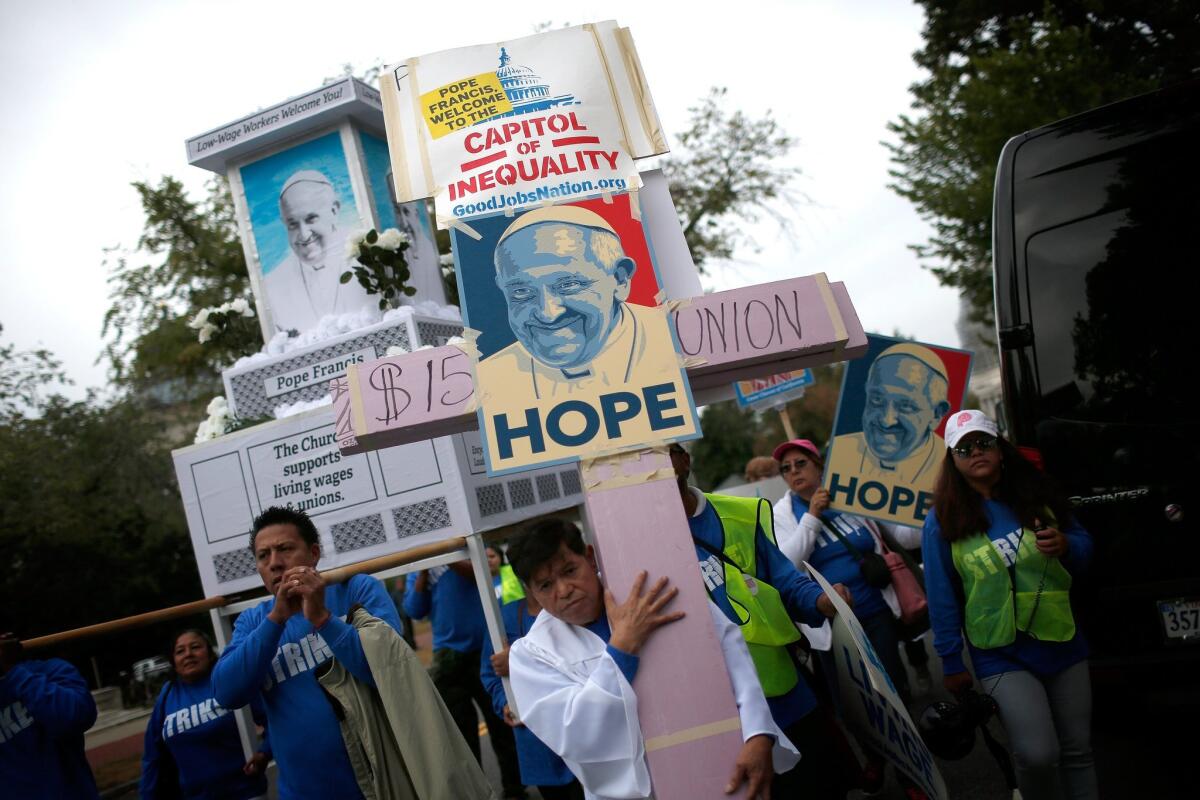Does a minimum wage raise hurt workers? Economists say: We don’t know

Striking U.S. Capitol workers on Tuesday combined a demonstration in favor of a $15 minimum wage with a welcome for Pope Francis.
- Share via
There are many explanations for why the Scottish philosopher Thomas Carlyle first labeled economics the “dismal science,” but here’s another example of why the term may be apt.
The Initiative on Global Markets at the University of Chicago’s Booth School of Business polled 42 nationally ranked economists on the fundamental question of whether raising the federal minimum wage to $15 over five years would substantially reduce employment of low-wage workers. the most common answer was: “uncertain.”
That was the reply of 38% of the respondents. About 26% thought it would do so, and 24% thought it wouldn’t.
We’d call that a draw.
What’s striking about the result is that the employment effect of the minimum wage is “one of the most studied topics in all of economics,” as economist John Schmitt observed a couple of years ago. After decades of scrutiny, evidently, no one has found enough empirical evidence that there is an effect.
Of course, that’s an argument in favor of raising the minimum wage, since what it tells us is that there’s no discernible downside to providing low-wage workers with a boost from the current federal minimum of $7.25 an hour. And there’s hardly question that it would help them. Last year, the Congressional Budget Office concluded that an increase even to $10.10 an hour would raise pay for 16.5 million workers, increase income for households earning less than three times the federal poverty line by a combined $12 billion, and move 900,000 people out of poverty.
The Chicago Booth panel includes some of America’s most distinguished economists, so their inability to come to a conclusion about the effect of a minimum wage increase on low-wage employment is noteworthy. Among them: Berkeley’s Emmanuel Saez and Barry Eichengreen, MIT’s David Autor, and Chicago’s own Austan Goolsbee, a former chief economist for the Obama White House. Most of the panel did believe the increase wouldn’t substantially increase overall economic output, but that hasn’t been much at issue, even among advocates of the increase.
Yet conservatives continue to oppose raising the minimum wage. Some prefer expanding the Earned Income Tax Credit; that’s not a bad idea, except that Congress doesn’t seem inclined to do that just now.
Many of those on Capitol Hill who oppose a higher minimum wage are representatives of the employer class, so it’s proper to remind them of what Franklin Roosevelt said in a Fireside Chat the night before he signed the Fair Labor Standards Act, which established the federal minimum wage (and outlawed child labor, too) in 1938:
“Do not let any calamity-howling executive with an income of $1,000 a day, who has been turning his employees over to the government relief rolls in order to preserve his company’s undistributed reserves, tell you ... that a wage of $11 a week is going to have a disastrous effect on all American industry.”
It’s fair to observe that it’s not unusual for “uncertain” to be a common response to questions put to the Chicago Booth panel. But there’s a big difference when that’s the answer to a breaking economic event, such as whether the Greeks would be better off voting in July to stay in the Eurozone (33% “uncertain”) and when it applies to a question that has been under scrutiny by economists for nearly 80 years. The bottom line is that if the economists can’t agree that a raise would cost low-wage workers jobs, there’s no basis for politicians to claim it would.
(One last point: Some evidence points to Carlyle having labeled economics the “dismal science” because the law of supply and demand didn’t support his conviction that slavery was a good thing. Dismal indeed.)
Keep up to date with the Economy Hub. Follow @hiltzikm on Twitter, see our Facebook page, or email michael.hiltzik@latimes.com.
MORE FROM MICHAEL HILTZIK:
The cost of defunding Planned Parenthood: Reduced healthcare for 650,000 women
A huge spike in the cost of an old drug reignites the pharma pricing debate
How a rich water district beat the federal government in a secret deal
More to Read
Inside the business of entertainment
The Wide Shot brings you news, analysis and insights on everything from streaming wars to production — and what it all means for the future.
You may occasionally receive promotional content from the Los Angeles Times.











